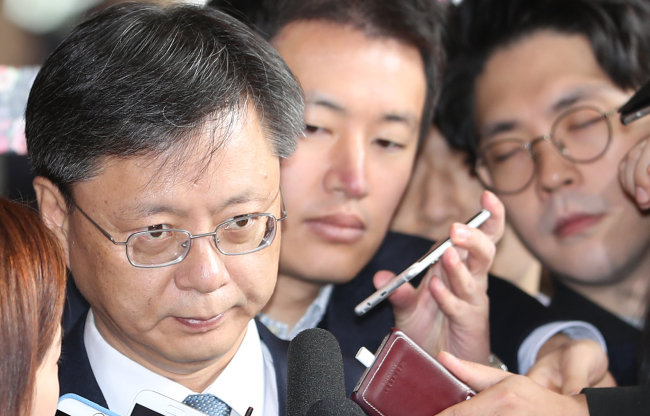The prosecution Sunday questioned President Park Geun-hye’s confidante and former aides in relation to an influence-peddling scandal, as investigation zeroed in on what role the president played.
Early in the morning, An Chong-bum, a former senior presidential secretary for policy coordination, was arrested on charges of abusing authority and attempted coercion, referring to his alleged involvement in raising funds for nonprofit organizations as a cover to channel money to Park’s longtime friend Choi Soon-sil.
Funds worth some 80 billion won ($70 million) was raised by contributions from local firms -- including Lotte Group, SK Group and Posco -- for the Mir Foundation and K-Sports Foundation.
An and Jeong Ho-seong -- a former secretary for private presidential affairs suspected of leaking government documents to Choi -- were grilled Sunday, along with Choi herself.
The scandal centers on suspicions that Choi -- a 60-year-old civilian and the daughter of Park’s mentor Choi Tae-min -- had accessed presidential documents and classified information, meddled in various state affairs, siphoned state funds and received unlawful favors.
Early in the morning, An Chong-bum, a former senior presidential secretary for policy coordination, was arrested on charges of abusing authority and attempted coercion, referring to his alleged involvement in raising funds for nonprofit organizations as a cover to channel money to Park’s longtime friend Choi Soon-sil.
Funds worth some 80 billion won ($70 million) was raised by contributions from local firms -- including Lotte Group, SK Group and Posco -- for the Mir Foundation and K-Sports Foundation.
An and Jeong Ho-seong -- a former secretary for private presidential affairs suspected of leaking government documents to Choi -- were grilled Sunday, along with Choi herself.
The scandal centers on suspicions that Choi -- a 60-year-old civilian and the daughter of Park’s mentor Choi Tae-min -- had accessed presidential documents and classified information, meddled in various state affairs, siphoned state funds and received unlawful favors.

Woo Byung-woo -- the former senior secretary for civil affairs accused of embezzlement and abuse of authority -- is also being suspected of condoning Choi’s actions. He refused to comment on the issue when appearing before the prosecution for questioning Sunday.
As investigators brace themselves for the unprecedented prosecutorial questioning of an incumbent president, the focus now is on the extent to which Park was involved in the scandal.
Local media reported recently that An had said his role in raising funds for the foundations was under orders from Park herself. Another report claimed that Park ordered her staff to have the 30 biggest conglomerates in the country raise 100 billion won ($87.6 million) for the foundations, in stark contrast to her saying previously that the donations were done with a “helping hand out of good intent.”
Park on Friday issued an apology for the scandal and vowed to cooperate with the ongoing prosecutorial investigation, as well as a separate probe by an independent counsel, if necessary.
Although Park has admitted to letting Choi revise her speeches in the early part of her time in office, she claimed that this stopped as soon as the presidential staff was formed. But a tablet PC supposedly owned by Choi shows that leaking classified documents continued well into the later part of Park’s tenure, and included sensitive information such as secret military meetings with North Korea.
The Constitution states that a sitting president is immune from criminal prosecution while in office, unless he or she has committed treason via instigation.
But Kim Seon-Taek, a professor of constitutional law at Korea University, said in a recent column that the clause only postpones the time of indictment of a president until he or she has left office.
“Even if the president cannot be prosecuted immediately, one needs to be investigated for acquisition of evidence for post-retirement indictment. ... Therefore an investigation for evidence gathering and preservation can and must be conducted on an incumbent president,” he wrote.
Justice Minister Kim Hyun-woong on Thursday told the National Assembly that the ministry will recommend to the president that she subject herself to questioning, if deemed necessary to uncover the truth. It marked a flip-flop from an earlier stance when he said that Park would not be subject to a probe.
Local civic group People’s Solidarity for Participatory Democracy has filed criminal charges against Park, An and Jeong, long with other Cheong Wa Dae officials and heads of local conglomerates on multiple suspicions including bribery, obstruction of civic duties, violation of laws concerning military secrets, leaking classified diplomatic relations and violating the law on presidential documents.
The prosecution has yet to apply bribery charges to anyone involved in the scandal, instead focusing on those who have abused authority. This has raised concerns that the investigators are “going easy” on the president and her aides, by apparently not recognizing the illegal nature of the foundations’ establishment.
While there has been initial debate over whether a president should be probed while in office, a series of evidence, testimonies and public anger have tilted the scales against her.
A Gallup Korea poll showed 5 percent approval rating for Park -- an all-time low for any South Korean president. An estimated 200,000 citizens also gathered in central Seoul on Saturday, demanding Park step down.
By Yoon Min-sik (minsikyoon@heraldcorp.com)



![[Exclusive] Korean military set to ban iPhones over 'security' concerns](http://res.heraldm.com/phpwas/restmb_idxmake.php?idx=644&simg=/content/image/2024/04/23/20240423050599_0.jpg&u=20240423183955)




![[Herald Interview] 'Amid aging population, Korea to invite more young professionals from overseas'](http://res.heraldm.com/phpwas/restmb_idxmake.php?idx=644&simg=/content/image/2024/04/24/20240424050844_0.jpg&u=20240424200058)
![[Pressure points] Leggings in public: Fashion statement or social faux pas?](http://res.heraldm.com/phpwas/restmb_idxmake.php?idx=644&simg=/content/image/2024/04/23/20240423050669_0.jpg&u=)










